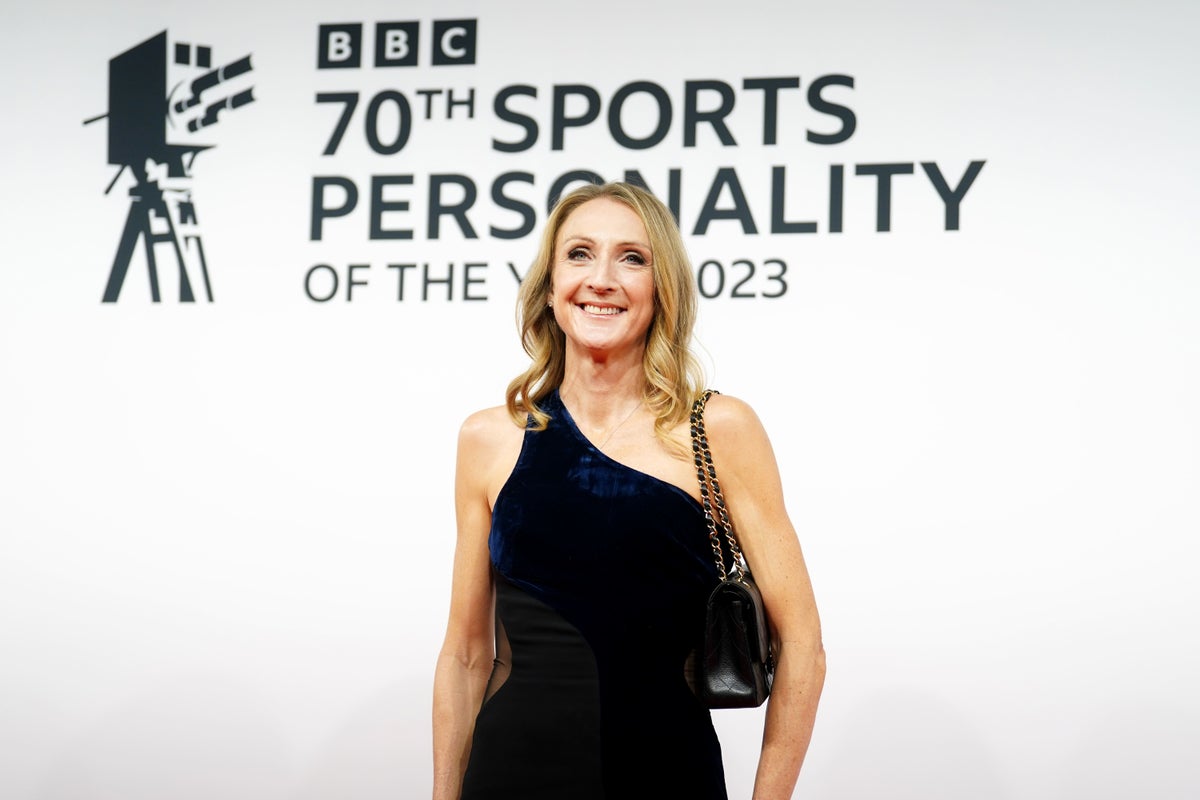Paula Radcliffe: ‘The mindset of a marathon is a great precursor for going through life’

One of Britain’s most successful ever sportspeople, distance runner Paula Radcliffe, may have retired 10 years ago, but this year she completed two marathons for the first time since hanging up her professional running shoes.
“It was definitely with a view to taking part,” the 51-year-old says, with a laugh, and she has to manage a foot joint niggle doing 26.2 mile races these days.
“And the camaraderie of runners together on marathon day – it’s very special. You have 50,000 or 60,000 people, largely going through the same motions, on the same day and sharing that together.”
Radcliffe, who held the women’s marathon world record from 2003 to 2019 after setting a time of 2:15:25 in London, completed the Tokyo and Boston marathons in the spring and plans to run the Kielder Marathon, Northumberland, in October.
But her relationship to running has evolved in the past decade. Previously, “pushing myself and seeing how good I could be was this huge motivating factor – now it’s just like, OK, I feel a bit better after I’ve run.”
Plus, the three-time winner of the London Marathon says running gives her time to think. “That’s one of the reasons I try and encourage kids to find the sport that’s good for them. It may not be running, but it was running for me, and when I was going through the stress of exams or trying to work on homework problems, I would find if I went out for a run, part way through that run, sometimes, [I’d realise] ‘Oh that’s how you do it’.
“Even now, if I’ve got a full day of work, it’s like that. My mind is a little bit sharper. If I’m trying to write something, I’ll go out for a run first and then come back and start writing. [It could be] the increased oxygen to the brain, I don’t know.
“And equally, when I’ve been through tough times, when I lost my dad [in April 2020], it’s like processing, it’s perspective.”
The retired athlete now makes regular appearances in the BBC Sport broadcasting team for athletics and long-distance events, as well as co-hosting the Paula’s Run Club podcast with distance runner Chris Thompson.
Learning to cope with the psychological journey of a marathon has been a great lesson in getting through challenging times too, she notes.
“I think the mindset of the marathon is a great precursor for going through life. There are ups and downs in the marathon, and you basically get through them by using your coping techniques, by trying to stay in the moment, by focusing on what’s good and what you can do rather than what you can’t do.
“It’s essentially the same metaphor for life; what can you do? If there are things outside of your control, focus on them a bit less, because there’s not much you can do [about them] and recognise that it does get better.
“And when you go through down times, either flipping back to previous good times or looking forward to ones that are to come.
“If you’re having a bad patch, even just visualising a time where remember the time that felt really good and really in control, think about that,” she suggests. “I’ll just count, over and over, up to 100 – that was my coping technique for grounding me in the here and there, one foot in front of the other.”
She is now based in Monte Carlo, Monaco, with husband Gary Lough and children Isla and Raphael, leaving the UK after the 2004 Athens Olympics – in which she famously withdrew from the race around the 23-mile mark. The location lends itself to an outdoorsy lifestyle and these days, she would rather run through forests than pound pavements.
“I really appreciate when you’re out on a beautiful trail run, [I feel] extremely fortunate to be able to be out there in the beautiful countryside, breathing in clean air that, sadly, not everyone has access to.”
View this post on Instagram
Health Equals says more than 12 million children in the UK are at risk of lifelong health problems due to toxic air, with more than 25,000 schools in areas that breach World Health Organization (WHO) air-quality guidelines. The campaigning coalition say the worst affected are Greater London, Greater Manchester, West Yorkshire and inner-city Birmingham.
The impact on health can include asthma and other lung conditions, as well as an increased risk of heart disease and stroke, say the group, with Black, Asian and minority ethnic groups, as well as those of low incomes, more likely to be affected.
For Radcliffe, the statistics hit hard. “I spend a lot of my time trying to encourage people to get outside and kids to walk to school and to be more physically active, because of all the benefits that physical activity can bring. But breathing clean air is a basic right and if they’re going to be active in an area that isn’t safe for them, it’s really scary.”
Running in heavily polluted areas might even be doing us more harm than good. “It should be something that’s good for you ≠ and it is, if you’re exercising in clean air – but [if not] it actually works the other way. You’re better off sitting down in a chair doing nothing.”
As an asthmatic, she’s conscious of the quality of air she’s breathing in too. “My asthma is induced largely by pollen, cigarette smoke is another [trigger] and pollution is a big one. So I became aware of it through my career, travelling to more polluted cities and noticing [the impact] it had on my asthma.”
In her 50s, she likes to use running to explore new areas. “It’s a great way to explore new cities, new places when we’re on holiday.”
But also, “as a mum of teenagers, there are times when you just want to escape everybody and shut the door on everyone!”
And what about that elusive ‘runner’s high’? “It’s very unique to everybody,” she says, “It’s not like suddenly feeling euphoric. For me, it’s more generally content, a little bit more relaxed, everyday things that annoy you, annoy me a little bit less.”
View this post on Instagram
Paula Radcliffe’s tips for beginner runners over 50
1. Prioritise good nutrition and sleep – “Try and eat immediately after running because it helps the body to recover better.”
2. Complement running with strength exercises – “Everyone just wants to get an outdoor run in, but build a little bit of core exercises, basic planks, foot strength exercises, calf raises.”
3. Remember to stretch before and after.
4. Set goals – “I really recommend joining a running club or group and once you’ve got the motivation, work towards completing your local Park Run or doing a half marathon.”
To be part of the solution, visit healthequals.org.uk and use the hashtag #MakeHealthEqual.
[title_words_as_hashtags




